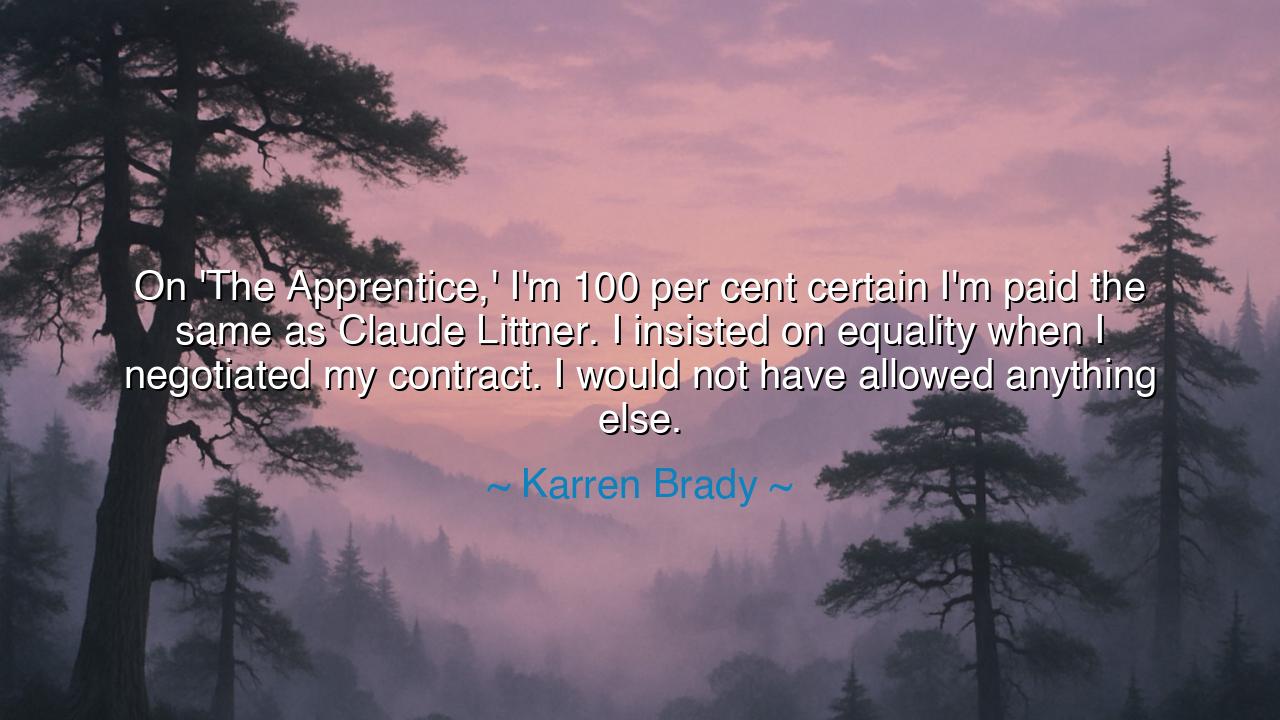
On 'The Apprentice,' I'm 100 per cent certain I'm paid the same
On 'The Apprentice,' I'm 100 per cent certain I'm paid the same as Claude Littner. I insisted on equality when I negotiated my contract. I would not have allowed anything else.






The words of Karren Brady, “On ‘The Apprentice,’ I’m 100 per cent certain I’m paid the same as Claude Littner. I insisted on equality when I negotiated my contract. I would not have allowed anything else,” are not merely the proud statement of a successful woman — they are the voice of centuries of struggle distilled into one moment of triumph. In her declaration, we hear the spirit of those who refused to be undervalued, the resolve of those who demanded that worth be measured not by gender, but by merit. Her words are not boastful; they are sacred — a reminder that equality is not given, but claimed, and that dignity is something every human being must insist upon, even when the world would prefer their silence.
Karren Brady, known as one of Britain’s most formidable business leaders and a prominent figure on The Apprentice, did not rise by chance or privilege. Her story is one of determination — of a woman who entered the fiercely male-dominated world of football management and corporate power, and carved out her own rightful place through intelligence, courage, and endurance. When she says, “I insisted on equality,” she speaks for every woman who has ever walked into a room where her voice was undervalued and her labor underpaid. Her insistence is not a demand born of pride, but of justice — a reclamation of balance in a world that for too long tilted toward one side.
In her quote, we see the essence of the ancient virtue of self-worth. The philosophers of old taught that justice begins within the soul — that no one can command respect from others who has not first respected themselves. To “insist on equality” is to act from this inner harmony, to know one’s own worth so deeply that compromise would feel like betrayal. Just as Socrates refused to renounce truth to save his life, and Antigone defied kings to honor what was right, so too does Brady’s stance remind us that integrity means standing firm, even in negotiation. She would not “have allowed anything else,” for to accept less would have been to dishonor herself and the generations of women who fought before her.
History offers many examples of this same strength. Consider Emmeline Pankhurst, who in the early twentieth century led the suffragette movement in Britain. She too “insisted on equality,” but in her time, the price was not comfort — it was imprisonment, humiliation, and danger. Yet her resolve did not waver, for she believed that no society could be just if half its people were silent. Karren Brady’s insistence, spoken in the boardroom rather than the battlefield, is a continuation of that same flame — proof that the fight for fairness takes many forms, but always springs from the same eternal truth: that equality is not a privilege, it is a right.
And yet, Brady’s statement holds a deeper wisdom still — that equality must be negotiated, not merely hoped for. The ancients taught that virtue requires both courage and intelligence. To demand fairness is one thing; to ensure it through wisdom and preparation is another. When Brady sat down to negotiate her contract, she did not wait for others to recognize her value — she named it herself. Her certainty was her power, for uncertainty invites exploitation. Like a general before a campaign, she entered the field prepared, clear in her terms, unwilling to retreat. This is the discipline of equality: not the loudness of protest, but the quiet strength of conviction.
There is also humility in her tone — not the humility of submission, but of understanding that justice must be applied universally. Her words, “I’m paid the same as Claude Littner,” do not scorn her colleague; they affirm that equality benefits all, that it restores balance rather than destroys harmony. This is the wisdom of balance that Aristotle spoke of when he described justice as the golden mean — the state where neither excess nor deficiency rules, but right proportion. Brady’s equality is not vengeance; it is restoration — the rightful order of things.
Let this, then, be the lesson for every listener: do not wait for equality to be granted — insist upon it, calmly, firmly, and wisely. Whether in wages, in relationships, or in respect, you teach the world how to value you by how you value yourself. Speak not from anger, but from knowledge of your worth; act not from arrogance, but from truth. For when one person demands fairness, they open the path for many. The ancients believed that the measure of a civilization lies not in its wealth, but in its justice. By her words and by her will, Karren Brady shows that this measure is not found in law alone, but in the heart of each individual who dares to say, “I will not accept less than equality.”
Thus her declaration stands not merely as a personal victory, but as a modern parable — a reminder that equality is both a goal and a duty, both a privilege and a responsibility. It is the song of those who will not be diminished, a truth that outlasts time: that honor begins when one refuses to be undervalued, and peace is found only when all stand on level ground.






AAdministratorAdministrator
Welcome, honored guests. Please leave a comment, we will respond soon